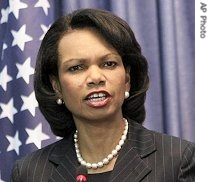2007年VOA标准英语-Rice Seeks 'Common Agenda' for Settling Israel-(在线收听)
Jerusalem
25 March 2007
U.S. Secretary of State Condoleezza Rice met Palestinian President Mahmoud Abbas and Israeli Prime Minister Ehud Olmert in separate talks Sunday as she continued a quest for what she termed a "common agenda" to move forward on a two-state solution of the Middle East conflict. She'll complete her fourth mission to the region in as many months on Monday with a meeting in Amman with Jordan's King Abdullah and follow-up talks with Israeli and Palestinian leaders. VOA's David Gollust is traveling with Rice and has this report from Jerusalem.
 |
| Condoleezza Rice speaks during a joint press conference with Palestinian President Mahmoud Abbas, not seen, in West Bank town of Ramallah, 25 Mar 2007 |
Rice's mission follows creation of a new Palestinian unity government and precedes a critical Arab League summit later this week in Riyahd.
She is pushing not only to revive a negotiating process between Israel and the Palestinians but to create a parallel peace channel between Israel and the Arab states based on their 2002 Beirut peace initiative.
That plan offered Israel normal relations with all 23 Arab League member countries for returning to 1967 borders and reaching a two-state solution to the conflict with the Palestinians, including settlement of the refugee issue.
Rice has repeatedly said on this trip she does not want to try to tell the Arab League what to do. But in a talk with reporters late Sunday before a dinner meeting with Israeli Prime Minister Olmert, she said it is a time for the Arab states to back up their expressed desire for a solution of the conflict with action.
"I've had very good discussions with the Arab leaders and I have a sense they understand and want to exercise their responsibilities for moving forward for peace," she said. "And I don't know how they will express it. But this is a time when it seems to me that there is a great desire to try and promote and a great desire to try and create the conditions for peace."
Rice said she hopes to find a "common agenda" between Israel and the Palestinians despite continuing problems, including the new unity government's refusal to accept international terms for peacemaking including a renunciation of violence and recognition of Israel.
She said with support from President Bush, she is prepared to continue investing time and effort to the task, while mindful that early breakthroughs are unlikely.
"My approach has been, I admit, careful. It's been step-by-step," she said. "I've not been willing to try for the 'big bang.' I don't think that that's where we are. I think that there are a lot of moving pieces here. I think the Palestinian unity government was a new factor as of a month ago. So to take the time to talk to the parties on the basis of the same questions and the same issues, I think is well-worth the time."
Rice began a long day of diplomacy with talks with Egyptian President Hosni Mubarak in the Nile River city of Aswan, before flying on to Tel Aviv from where she motorcaded to the West Bank town of Ramallah to meet Mr. Abbas.
The Palestinian president, who is due to attend the Arab League summit in Riyadh Wednesday, said he agreed the organization's 2002 peace plan needs to be reactivated. But, he resisted the idea it should be amended to deal with Israeli concerns.
"The Arab initiative, when it was launched was highly welcomed in the different Arab and international circles, and also in the Israeli circles," he said. "This initiative has become an important part of the 'road map' plan adopted by the Quartet. The road map has become a resolution of the [U.N.] Security Council with the number 1515. I didn't hear anybody saying that you need to amend or change or alter any of the articles of the Arab initiative."
Israeli officials say language in the Arab League plan providing for the return of refugees would threaten Israel's existence as a Jewish state unless it was amended to say that refugees should resettle only in the envisaged Palestinian state.
Earlier at a joint press appearance with Rice in Aswan, Egyptian Foreign Minister Ahmed Aboul Ghiet said any talk of the Arab League amending the initiative was "illogical" unless and until it became a subject of actual negotiations with Israel.